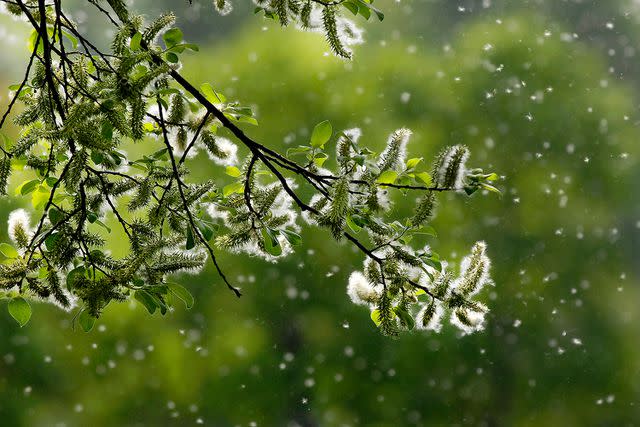Why Your Seasonal Allergies Are Worse Than Ever This Year
Warmer than usual winter weather has led to an earlier spring — triggering the start of allergy season

Getty
Hand reaches for tissuesSeasonal allergy sufferers are in for a rough time this year.
“Because the winter was wetter and warmer than average, we're seeing an opportunity to have an earlier growing season and a long growing season for plants,” David W. Rosenthal, DO, Attending Physician, Division of Allergy/Immunology at Northwell Health, tells PEOPLE.
And for those who are allergic to tree pollen, their reactions are already starting.
“We are starting to see an increase in the number of patients that are coming in for seasonal symptoms already,” Dr. Rosenthal tells PEOPLE. “They seem to be starting a little bit earlier, and a lot of people are complaining of the eye symptoms, specifically.”
But allergy sufferers don’t have to just sneeze and bear it, Dr. Rosenthal advises. There are ways to get relief from itchy eyes and scratchy throats — starting with what you wear.

Getty
Tree pollen“If you wear something to protect your eyes, like sunglasses or glasses, then you're actually able to prevent the pollen from flying into your eyes. It's the contact of the pollen with the mucus membranes of your eyes which cause a lot of that irritation. So wearing glasses or sunglasses when outdoors does make an enormous difference,” he explains.
If you usually take medication for your allergies, Dr. Rosenthal says “as soon as you start seeing the first flowers come up out of the ground, that's when you need to start taking your medication.”
Related: Mom Shows How Scary a Child's Allergic Reaction Can Be: 'We Didn't Realize How Severe It Was'
“The nose sprays specifically take approximately seven days before you have maximal benefit of them,” he notes. “The antihistamines can kick in quickly, but if you can stop the symptoms earlier, then you're going to have less symptoms all along.”
And taking those different types of medications is crucial, he explains, as one of the biggest mistakes people often make when it comes to treating their allergies is that “people sometimes will say, ‘I only want to take one medication and not two.' ”

Getty
Nasal sprayBut seasonal allergies require up to three different types of medications, Dr. Rosenthal explains: Eye drops, oral antihistamines and nose sprays.
Never miss a story — sign up for PEOPLE's free daily newsletter to stay up-to-date on the best of what PEOPLE has to offer, from juicy celebrity news to compelling human-interest stories.
“Thinking that you're taking too much medication or that there's going to be an interaction of medication is a common misperception,” he tells PEOPLE.
And when it comes to nose sprays, people are often doing it incorrectly.
“It's important that when you're in spraying the nose spray, that you point the nose spray towards the same ear that nostril is on, so that you can make sure that the medicine can get all the way up into your nose,” he advises, adding that you should be “taking a sniff in to try to bring that medicine up into your nose.”
Related: Asthma Medication May Help Children with Severe Allergies Safely Eat Nuts and Other Foods
If your allergies become unbearable, however, there’s really only one permanent cure, Dr. Rosenthal tells PEOPLE.
“The only way to really cure you of allergies is to have allergy shots or have immunotherapy, which teaches your body to not be allergic to those items in the long term.”
So, he advises, “If this allergy season is bad, and the last few seasons have been bad, instead of continuing to suffer year after year, then it may be worthwhile to see an allergist.”
For more People news, make sure to sign up for our newsletter!
Read the original article on People.

 Yahoo Lifestyle
Yahoo Lifestyle 
